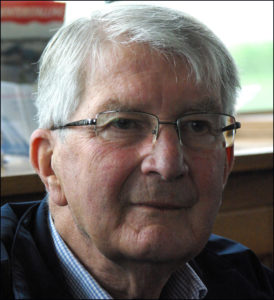In Memoriam Dirk van der Waaij (1931-2016)

Dirk van der Waaij
1931-2016
Dirk van der Waaij was the originator and one of the founders of the Old Herborn University Seminars. He had for a long time the wish to organise yearly meetings on the subject “microflora and immune system” and to publish the proceedings of these meetings in a series of monographs. This idea became reality in 1985 when Dirk and I attended the 10th International Symposium on Intestinal Microecology in Minneapolis, Minnesota (USA). During this symposium we had a meeting with Volker Rusch in the bar of our hotel and Dirk discussed his ideas on these yearly meetings with us. Volker had organised the Symposium on Intestinal Microecology the year before in Herborn, Germany as an honour to the University of Herborn (that was founded in 1584 by William I “the Silent”, but closed by Napoleon in 1812). Volker recognised in Dirks idea possibilities to restore the academic environment in Herborn and during that evening the “Old Herborn University Seminars” were born and the ideas of Dirk became reality.
Dirk, who was born in Semarang (in the Dutch East Indies, nowadays Indonesia), did spend 3 years (from 1942 until 1945) from his youth in Japanese concentration camps. During the last year of the war he was “hospital-care-taker-assistant” in a “boys concentration camp” housing boys of ten years and older. This might be the reason that, after finishing high school in the Netherlands, he decided to study medicine in Leiden. After completing his medical studies he performed his PhD studies in the Laboratory for Parasitology of the Leiden University and received his PhD title cum laude after defending his thesis entitled “Development and transmission capabilities of Toxoplasma gondii during experimental infection with chronic course in mice”. His studies included the role of innate immunity as well as adaptive immunity and can be considered as the start of his lasting interest in the relation between the microflora and the immune system, which was and still is one of the main subjects of the Old Herborn University Seminars.
After finishing his PhD studies, Dirk worked from 1959 until 1975 as head of the Department of Microbiology in the Radiobiological Institute TNO in Rijswijk, the Netherlands, where he started and maintained germ-free and SPF rodent colonies and where he also had the possibility to work with other laboratory animal species, such as beagle dogs and rhesus macaques. Here, Dirk developed his ideas on how to manipulate the microflora in order to prevent infections in immunocompromised patients as well as graft-versus-host disease, a serious immunological complication after allogeneic bone marrow transplantation. His concepts of complete and selective decontamination of the gastrointestinal tract, reverse isolation by the use of laminar airflow systems, as well as the concept of “colonisation resistance” have had great influence on the treatment of patients with leukaemia and other disorders of the haematopoietic system. He was the initiator of the Gnotobiotic Project Group of the European Organisation for Research on the Treatment of Cancer (EORTC), which performed several international multicentre studies on the effect of selective decontamination of the gastrointestinal tract and nursing under reverse isolation conditions on the survival of leukaemia patients during intensive chemotherapy.
In 1975, Dirk was appointed Professor in Bacteriology and Serology at the Department of Medical Microbiology of the University of Groningen where he worked until his retirement in 1992. He had many PhD students, working again on the relation between the microflora and the immune system, as well as on methods to characterise the microflora. Many of those students were speakers during the different Old Herborn University Seminars, in this way also disseminating the original ideas of Dirk.
During the years that he was active in organising the Old Herborn University Seminars, he had every year new ideas on how the program could give insight in, what he called, the white spots: the parts of the puzzle that were missing to understand the important influence of the microflora on immune and other functions of the host. After his retirement in 1992, Dirk continued to be a member of the Old Herborn Seminar Committee until he decided in 2009 that it was time to make place for the younger generation.
In the years after 2009, Dirk developed health problems that made it difficult for him to travel and thus to attend the seminars, but he was present at the 25th seminar during which his important role in founding and continuing the Old Herborn University Seminars was highlighted.
We miss him greatly and will remember him as a driven scientist whose original ideas and research still have a great influence on basic science as well as on the medical field. We express our condolences to his wife Hillie and his family.
Peter J. Heidt
